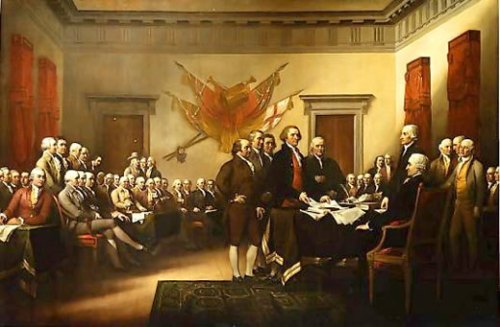— Michael Thomas Maxwell
On the Postmodern Conservative site, Ralph Hancock’s May 14 article titled “‘Founded-Better-Than-They-Said’ Studies?” resonates particularly with my own queries in the past 3 years as to whether the Founders kind of “stumbled” upon some sheer foundational brilliance merely as a matter of reasonable haggling. That, by a sort of commitment to the shared ideal that they were going to go about this thing in an “approach to pure reason,” and by that very process of reason they inevitably came upon the very same product that the fundamental brilliancies would have provided themselves.
The “Postmodern Conservative” thing was attractive I guess, which is why I clicked it, “postmodern” being such an over-obliterated term for quite some time now, and “conservatives” needing to get a grip on what the hell they’re talking about specifically anyway. Furthermore, it recalls a t-shirt idea that I very recently had. I was gonna have “Be’n Postmodern Since 1776” in the center over a recessed image of either the american bald eagle, in full wing-span and glory like on the Seal, or Ben Franklin’s original idea for the U.S. Seal, the one with the words “Rebellion To Tyranny Is Obedience to God” rounding a scene from Exodus. “Postmodern,” perhaps?
Anyway, for me, the invention that came, not out 1776’s Declaration of break-away, but out of 1787, after bungling about with the Articles of Confederation, represents a genius formulation of government structured on a principle of Duality at its most fundamental level. To put it simply, and eschewing the multiplicity of reflective dualities that ensue, when presented with a choice between One Centralized Authority and Many Localized Authorities, the Founders merely answered, “Well, who said we had to make a CHOICE?! Ah HA HA HA! How postmodern is THAT?!…”
And that brings the curious debate: Had the Founders ever came at once to a unified declaration of principle which would ground all succeeding selections of power and state? Furthermore, is it possible that a few men individually came to such enlightenments of ideal, but privately so while they were trying to hack out the math, like James Madison and the like would do when they had the task of persuading the states to ratify the new constitution and so started to try and bang out the reasons, and hence out popped the Federalist Papers? Could the foundational principles of our regime be an “afterthought”?
And what of these curious signs and symbols that litter the federal paradise? On the tails of the Seal, does the Eye of the pyramid float above the Mass? Is this some testament for a Representative Democracy — rather than a “pure”, referendum style democracy (“Power By Roadsigns”) — whereby some masonic physics produces a super-conductivity that levitates a forward regiment, an “avant-garde,” into the upper regions of progress (or at least, exploration) and the further reaches of our universe’s infinite span along plural planes, simply by the proper alignment of bodies in space? And do there occur periods in American History where that levitating division must “touch down” and enlighten the populace as to the terms and conditions (and genius) of their founding principles (and structure)? Like Abraham of Illinois, on four score and seven years ago, some seven score and seven years ago, when the states had lost touch with the founding elements of their union, and of the dual mechanics necessary for such a union, a union constructed out of severance?
It would be quite the thing, I think, if such things were “stumbled” upon, merely as a matter of exercise. Where principled debate over principles themselves can produce the enlightened equation out of the “pure” mechanics of logical process… per se.
Such an idea would suggest that, in the manner of whether the Founders “founded” the nation better than they spoke of its founding principles, or founded them, they more so founded the principle on accident, but it was an accident out of principles of process. Which presents another quandary: is the product that results after one throws the variables into the equation an accident as well? That, perhaps, the Founders did not know what the thing would look like after they built it, but they knew the principles along which it should be built, and therefore started to lay the frameworks according to those calculations, watching the structure as it rose.
Other resonant dualities that tickle my fancy include that between “the Right” and “the Left,” and the manic sort of division that has thus rendered our state impotent. (Not to mention the STATES.) Does not their mere existence, their ideals and subsequent amalgaments, indicate there is, perhaps, SOME kind of Truth that each possesses? That these two opposing conglomerations of like-wise half-wits actually form two halves of a sound idea? Perhaps they are spoken of in different languages, of varying experiences with varying meaning and associations, but one ought to consider that there is perhaps a real PERSPECTIVE to each party member that influences the essence of Truth that she distinguishes.


One thing to consider is that the founding didn’t occur in one moment. It was a long process that, more or less, was a battle between competing interests that conceded a little at a time. This would appear then that it was more accident than intention.
Perhaps the only real intention that has protected America these long years is its love of private property and protection of contracts. I think that was of supreme importance to all involved and this has kept America from tyranny all these 200+ years.